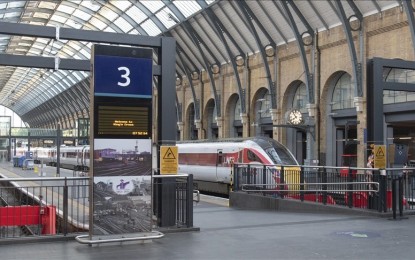
WALKOUT Around 40,000 rail workers are expected to join a series of walkouts after a pay offer denial. The strike came after Rail, Maritime and Transport Union a pay offer by the Network Rail on Tuesday (Dec. 13, 2022). (Anadolu)
LONDON – About 40,000 rail workers across 14 train companies are expected to join a four-day walkout this week after Rail, Maritime and Transport Union (RMT) rejected a pay offer.
The rail strike began Tuesday amid freezing weather, with commuters facing significant travel disruptions, especially students who ride trains to school.
The industrial action will continue until Saturday, followed by further action from Christmas Eve (Dec. 24) until Dec. 27 and two more 48-hour strikes beginning January.
Network Rail which owns the UK’s rail infrastructure urged passengers to travel only if absolutely necessary as cold weather, including snow, ice, and fog, continues to cause disruptions across the country.
The walkout came after RMT members rejected the offer of Network Rail of a 5% pay rise this year and another 4% pay rise in 2023.
Network Rail officials accused the union of "playing fast and loose with peoples' Christmas plans."
But RMT General Secretary Mick Lynch said: "The government is refusing to lift a finger to prevent these strikes and it is clear they want to make effective strike action illegal in Britain. We will resist that and our members, along with the entire trade union movement, will continue their campaign for a square deal for workers, decent pay increases and good working conditions."
Lynch described the deal “substandard” and the members have refused it.
Britain is facing a fresh wave of industrial action, including by nurses, postal workers, and university lecturers, sparked by a bitter cost-of-living crisis triggered by soaring inflation and a deteriorating economy.
UK annual inflation jumped to 11.1% in October from 10.1% in September, its highest since October 1981, leading to a fall in real wages. (Anadolu)
